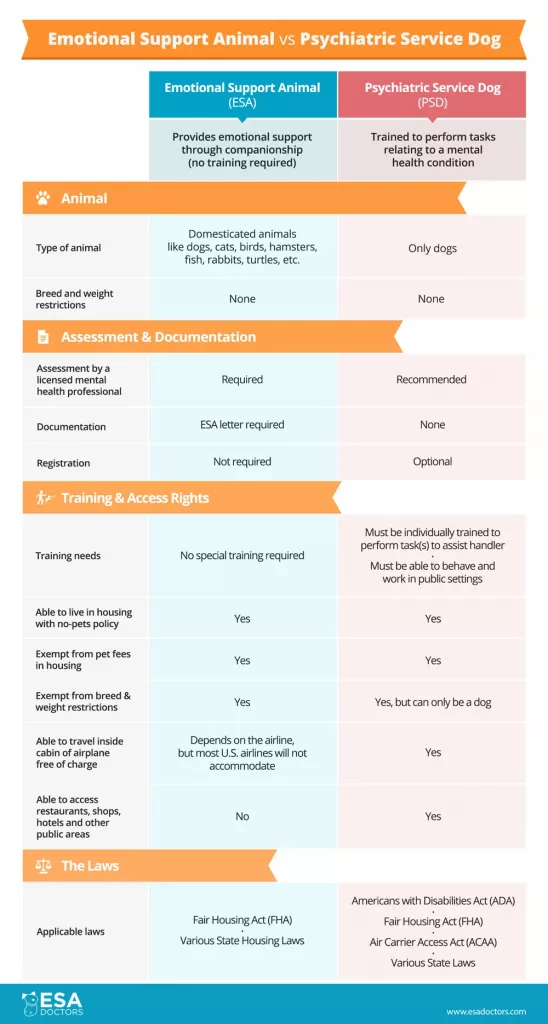If you’re trying to decide whether your pet can be a service animal or an emotional support animal, the biggest question to answer is what you need them to do. A service animal is a highly trained dog that can help you by performing tasks relating to your disability, including psychiatric ones. An emotional support animal provides comfort just by being around to help manage mental health challenges. No special training is required at all, but you do need an ESA letter.
While both can support mental health, they have different roles and come with different rights and requirements. See the chart below for a quick overview of the differences.

Types of Assistance Animals for Mental Health
Before we get into all the differences, you should first understand that there are three distinct categories when it comes to mental health support animals:
- Emotional support animals (ESA) help through companionship and comfort. They’re not trained for tasks but their presence helps relieve symptoms of mental health conditions.
- Psychiatric service dogs (PSD) are trained to help people with mental health disabilities by performing specific tasks. For example, a PSD might:
- Provide pressure during anxiety attacks
- Remind their handler to take medication
- Check rooms for safety during PTSD episodes
- Wake their handler during night terrors
- Guide them home during dissociative episodes
- Create space in crowded areas for someone with anxiety
- Traditional service dogs help with physical disabilities, though some may be cross-trained to help with both physical and psychiatric health issues.
Choosing Between a Psychiatric Service Dog and an ESA
If you’re considering an assistance animal for mental health support, the key question is whether you need an animal trained to perform specialized tasks or whether companionship alone would provide sufficient support.
Ask yourself:
- Do you need the animal to perform specific actions to help you cope with your disability?
- Would the animal need to accompany you in public places or just your home?
- Would emotional comfort alone be sufficient support?
- Do you need to be able to travel with your assistance animal?
- Is your animal not a dog?
For example, if you experience panic attacks and need an animal to perform specific actions like providing deep pressure therapy or bringing you medication, a psychiatric service dog might be in order. If you just need a loving animal at home to help you cope with depression or anxiety, an emotional support animal might be the better choice.

Legal Protections and Rights
Service dogs, including psychiatric service dogs, are protected under the Americans with Disabilities Act (ADA). This means they can be with their handlers anywhere the public is allowed to go. The law makes no distinction between physical and psychiatric service dogs — they have identical rights and protections. Service dogs are also protected under the Fair Housing Act and the Air Carrier Access Act. That allows them to live in no-pets buildings and board flights.
Emotional support animals are protected mainly in housing. While they’re covered under the Fair Housing Act, allowing them to live in most housing regardless of pet policies, they don’t have public access rights. This means they can’t go into restaurants, stores, or other public places that don’t allow pets. Qualifying for an emotional support animal is easier since your pet doesn’t have to undergo any special training.
What does it take to qualify?
Getting a service dog isn’t as simple as deciding you want one. You need to have a disability that significantly impacts your daily life, and the dog needs to be trained to help with specific tasks related to that disability. For instance, if you have an anxiety disorder, a service dog might be trained to calm you when you’re having a panic attack. You don’t need any special documents for a service dog other than the DOT’s Service Dog Form when you fly. If you’re not sure about whether you have a qualifying mental health disability, requesting a PSD letter might be right for you.
Getting an emotional support animal works differently. You’ll need to see a mental health professional who can verify that you have a mental health condition and that an emotional support animal would help you cope with it. This might be the case if you struggle with depression, anxiety, or PTSD, and your therapist believes that an animal’s companionship would be beneficial to your mental health. To confirm you really have an emotional support animal, you’ll need proof in the form of a signed ESA letter from your mental health professional.
What kind of animals are we talking about?
When it comes to service animals, federal law is crystal clear: only dogs (and, in rare cases, miniature horses) can be service animals. While other animals may be intelligent and trainable, the ADA only recognizes dogs as service animals at this time.
For emotional support animals, the options are much wider. Any animal that provides comfort and can be reasonably housed could qualify, including:
- Dogs and cats (the most common choices)
- Small mammals like rabbits, guinea pigs, or hamsters
- Birds, from parakeets to parrots
- Fish
- Reptiles
The key consideration for ESAs isn’t species but rather whether the animal:
- Can live safely in your home environment
- Does not pose a danger to others
- Provides genuine emotional support

Documentation: what’s really required?
Here’s something that surprises many people: legitimate service dogs don’t need any special certification or documentation. In fact, those service dog registries you see online, they’re not actually required. When someone with a service dog enters a business, staff can only ask two questions: (1) whether the dog is required because of a disability, and (2) what tasks the dog has been trained to perform.
Emotional support animals require more formal documentation than service dogs. You’ll need a letter from a licensed mental health professional explaining that you have a mental health condition and that the animal helps you manage it. This letter needs to be current and may need regular updating, especially for housing purposes.
Where can they go?
Service dogs can go pretty much anywhere their handler goes — it’s that simple. They’re allowed in restaurants, shops, hotels, apartments, airplanes, and even hospitals. The few exceptions might be places where the dog’s presence would fundamentally alter the nature of a service (like a sterile operating room) or cause legitimate safety concerns.
Emotional support animals have legal rights for housing — landlords generally must allow them even in “no-pets” buildings. ESAs are also exempt from size and breed restrictions. Beyond that, they’re typically only allowed where regular pets are welcome. Want to take your emotional support animal to a restaurant? That’s up to the restaurant owner. ESAs will also be treated like regular pets on flights.
Making Your Decision: ESA or Service Dog?
The decision between a service dog and an emotional support animal isn’t just about preference — it’s about matching the correct type of assistance to your specific needs. Consider these factors:
- Do you need active assistance with specific tasks?
- Would emotional support alone meet your needs?
- Can you maintain a service dog’s training?
- Do you need public access rights?
There are also practical considerations to consider:
- Can you afford the initial and ongoing costs?
- Do you have time for training and maintenance?
- Is your living situation suitable?
- Do you have access to appropriate veterinary care?
- Can you provide for the animal’s entire lifespan?
Remember that this isn’t a one-size-fits-all decision. Some people benefit from both — having an ESA at home and a service dog for public access and specific tasks. Others might start with an ESA and later transition to a service dog as their needs change. The key is finding what works best for your specific situation and circumstances.





Leave a Comment